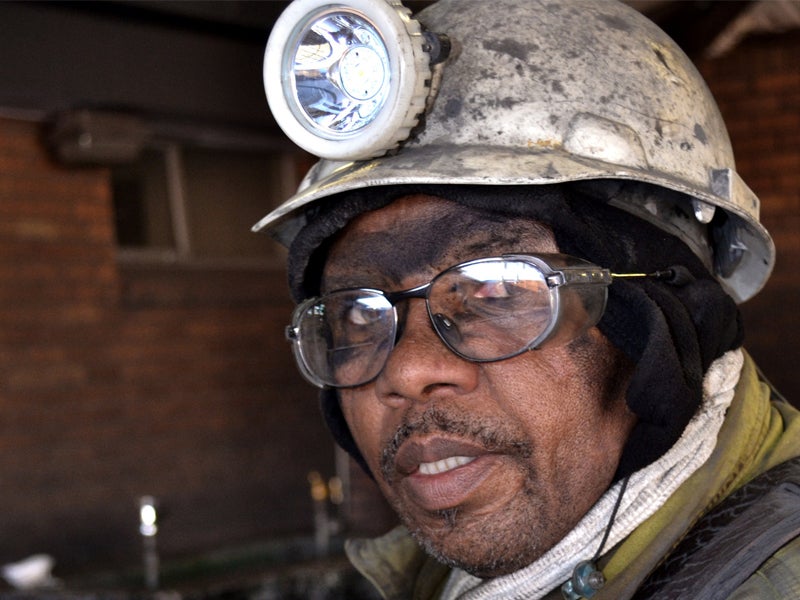Fighting South Africa’s Coal Cartel
Earthjustice attorneys Martin Wagner and Ramin Pejan recently returned from South Africa where they experienced the country’s beauty—but also the growing threat of destruction from coal mining and consumption.

This page was published 9 years ago. Find the latest on Earthjustice’s work.
Last month, my colleague Ramin Pejan, a staff attorney in Earthjustice’s international program, and I traveled to Cape Town and Pretoria in South Africa. We went to deepen our collaboration with lawyers from the Centre for Environmental Rights—a non-profit working to defend South Africans’ right to a healthy environment—and to meet with activists working to protect their communities against the ravages of mining.
South Africa is a beautiful country with a spectacular natural environment and warm, welcoming people. We were fortunate to see some of the iconic species and stunning landscapes that give the country an international reputation as a haven for biodiversity. Walking along the Olifants River, we saw elephants and hippos, lions and honey badgers, birds and insects and plants of all kinds.
Unfortunately, we also saw the destruction wrought by widespread coal mining and consumption that is destroying not only this nation’s natural environments, but also the people who depend on them. We saw the impunity with which mining companies are profiting at the cost of the poor and the environment. We drove through landscapes where poor townships are squeezed between open-pit mines, toxic slag heaps and power plants spewing pollution into the air and water. Hearing first-hand accounts of activists harassed and killed for advocating for a healthier life for their communities, we came to understand what’s at stake in this battle.
And beyond the harm specific to South Africa, burning this coal is a grave threat to the future of Earth’s climate.
As the world’s 5th largest coal exporter, 6th largest coal consumer and 7th largest coal producer, South Africa’s powerful corporations coerce communities into giving up their land in exchange for air and water pollution and dangerous jobs that pay little more than slave wages. These corporations proceed with their plans without meaningful consultation with or consent from the communities most affected.
One such project is the MW Thabametsi power plant in Limpopo Province—one of nine proposed coal-fired power plants in the country. As a result of projects like these, mining companies and their executives reap massive profits while local communities live with destroyed landscapes and dangerous, low-paying jobs.
Earthjustice is working with the Centre for Environmental Rights to challenge the adequacy of the Thabametsi project’s climate change assessment, which is the first such assessment for a proposed project in South Africa. Such an assessment would allow the local community, government decision-makers and the project’s financial backers to understand the implications of building a water-intensive power plant in a region that is already suffering from a climate change-induced drought projected to worsen in coming decades, and to decide whether to lock themselves into 30 or more years of dirty coal-fired power in a country with substantial capacity to develop renewable energy.
South Africa’s leadership appears to be moving backward with respect to climate and energy policy. While much of the world advances toward using modern sources of renewable energy, the country is shackling itself to more dirty, dangerous and increasingly expensive coal-generated power. Plus, these dirty coal developments undermine South Africa’s ability to be a serious global player in the fight to control climate change.
South Africa’s constitution provides that “Everyone has a right…to an environment that is not harmful to their health or wellbeing.” This right could be a model for the world. Unfortunately, in far too many cases, it seems to be no more than a paper promise because the government appears to be unwilling or unable to enforce laws that should protect communities and the environment.
In addition, all three essential democratic protections designed to prevent environmental harms like those associated with the mining and burning of coal appear to be missing in South Africa:
- Communities and individuals cannot access the most important information about potential environmental and health harms, which prevents them from participating meaningfully in the decision-making process.
- Consultation with these communities is inadequate, leaving them unable to refuse consent to mines or power plants that threaten to poison them or destroy their land.
- There is little meaningful access to justice for those whose environmental rights have been violated.
We feel deep concern for the dangerous circumstances under which the exploited members of these communities are living and working. Their fundamental human right to advocate and protest is violated daily, and many people fear the police as much as the mining companies.
Despite these problems, we were inspired to see such incredible talent and commitment among the activists and lawyers seeking to protect South Africa’s communities and environment from the coal industry. We look forward to continuing to collaborate with them and to offering Earthjustice’s 45 years of expertise using the law to protect the environment and human health to support their important work.
The International Program partners with organizations and communities around the world to establish, strengthen, and enforce national and international legal protections for the environment and public health.